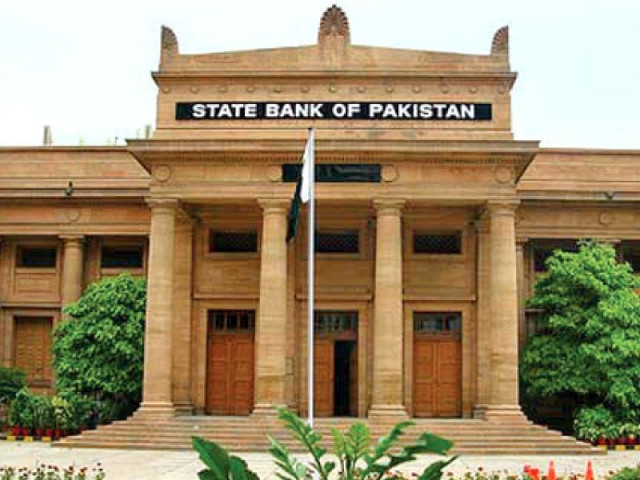View from Mcleod road: Dear bond market, underestimate the SBP at your own peril
Narrowing the interest rate corridor is a precursor to entry into the IMF programme.

The central bank has narrowed the interest rate corridor – difference between interest rate at which banks borrow from SBP and rate they receive on deposit of surplus cash with SBP – from 300 basis points to 250 basis points. PHOTO: FILE
The Karachi bond market – dominated by the large banks – had been anticipating that the State Bank of Pakistan would keep interest rates unchanged, and that is exactly what happened. So there should have been no surprises in the government bond market, right? Not quite.
The State Bank also decided to narrow the interest rate corridor, from 300 basis points to 250 basis points. The interest rate corridor refers to the difference between the interest rate at which banks can borrow cash from the State Bank and the interest rate which banks can receive when they deposit surplus cash at the State Bank. The ‘ceiling’ of that corridor is equal to the discount rate (in this case, 9.5%). The ‘floor’ of the corridor has now been raised to 7%.
In order to understand why this matters, it is first necessary to understand why the State Bank has been conducting so many open market operations (OMOs) in the treasury market.
Ostensibly, the SBP buys up government bonds from the banks in the repo market to solve a ‘liquidity shortage’: when the banks are running low on cash. That shortage exists not because of some extraordinary market conditions but because the SBP allows it to. Why?
Because the banks keep their cash levels dangerously low in order to be able to buy more treasury bonds, which means – in effect – that they are lending more money to the government. The banks like this arrangement because it allows them to earn interest on treasuries rather than earn nothing on their cash pile. The finance ministry likes it because it means they have more money that they can use to fund the federal fiscal deficit. And so the finance ministry makes the State Bank continue to ‘help’ the banks out when they run low on cash by conducting OMOs.
The banks, of course, can simply deposit their cash with the State Bank and earn a healthy return on it as well, though that return used to be much lower than the net return they make under their current strategy. By raising the ‘floor’ rate, the SBP effectively made it a little less attractive for the banks to continue running low cash levels and relying on the central bank to step in and help them out when they need more cash.
On Monday morning, the banks are going to start selling some of their government bonds in order to get their cash levels back up to where they should be. And this is where the wheat shall be separated from the chaff.
“There is going to be an absolute massacre in the PIB [10-year government bond] market,” said one senior treasury official at one of the banks that had anticipated this change and appears to have been ready for it. The banks that foresaw this will make money and those that did not will lose money.
Yet, in truth, the banks should have seen this coming. The State Bank has been saying for months now that it hates the fact that the banks have stopped lending to the private sector and wants them to get their act together. It shot the first salvo across the banks’ collective bow in January 2012, when it raised the minimum interest rate on savings accounts, which was meant to get the banks to look for higher interest rates on lending by finding more private sector clients. And it has stated its intentions repeatedly in every quarterly report and every monetary policy announcement.
So why did the banks miss the warning? Primarily because they underestimate the degree to which the State Bank under Yaseen Anwar is determined to retain at least some measure of independence.
Anwar is largely seen by McLeod Road is a weak figure, particularly since he refuses to directly confront the finance ministry. Yet the truth is that he has no choice. After Senator Ishaq Dar almost single-handedly eviscerated the State Bank’s independence through the new State Bank Act, the SBP must effectively kow-tow to the finance ministry.
And Anwar’s more diplomatic manner should not be mistaken for weakness. He realises that there is no point in confronting the finance ministry on government borrowing because Q Block does not care about interest rates. So he is targeting the only people in Pakistan who care: the banks, who also happen to come under his supervision.
The narrowing of the corridor is widely being seen as a condition that the IMF imposed on the State Bank. “This is the precursor to an orderly exit from OMOs and an entry into the IMF programme,” said one bank treasury official.
But who do you think gives the IMF these ideas? The IMF has its own ideas about what constitutes good policy and what it thinks needs to be done. But the specifics always come from within the government of Pakistan. The State Bank has made no secret of its desire to limit government borrowing from the banks. And in the IMF it has found a convenient and useful ally.
The banks would do well to stop mistaking Yaseen Anwar’s diplomatic tone for weakness. It may just save them a little money.
Published in The Express Tribune, February 10th, 2013.


















COMMENTS
Comments are moderated and generally will be posted if they are on-topic and not abusive.
For more information, please see our Comments FAQ